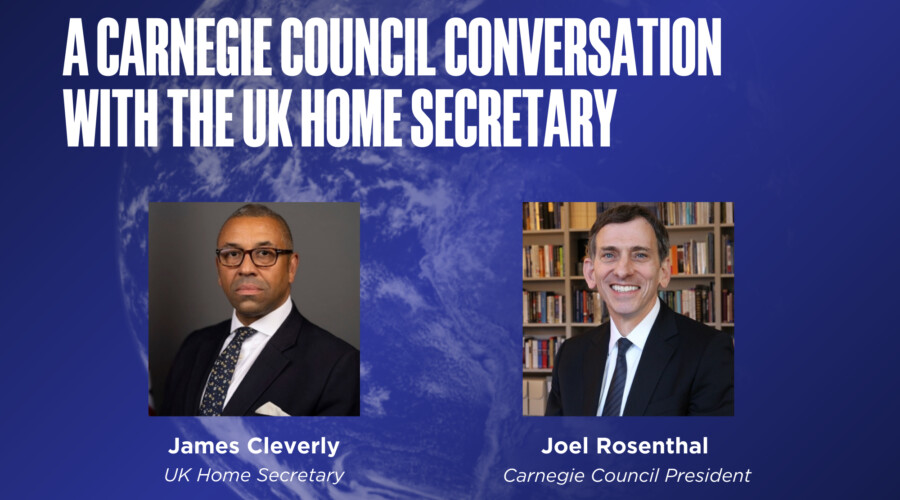Originally from Singapore, Xinle Su is a first-year student of environmental sciences at the University of Tokyo.
Essay Topic: In your opinion, what is the greatest ethical challenge or dilemma facing the planet?
The Responsibility of the Individual
What first flitted to my mind when asked about the greatest global ethical challenge—no doubt influenced by my background as an environmental science major—was the ethical challenge that beleaguers most international environmental summits about how much responsibility for the environment each nation should take, when the circumstances of each nation are much varied. Yet within moments, I realized there was something unconvincing about it being the greatest ethical challenge facing our planet: because as wide-ranging as the impact the environment has on us globally, there is perhaps a clear demarcation between terrorism as we know it—another global issue—for example, and the human environmental impact. Who is to measure which issue is of the greatest importance to the planet, especially when despite being global issues, these issues afflict some countries more than others? This cannot be resolved easily. Closer examination, however, brought me to the notion of a shared ethical challenge all of us as individuals face, transcending global issues and national borders—the ethical challenge of how much we should individually pursue, if we do at all, causes that while collectively endanger the human population, seem very much detached from our everyday lives.
Consider the parallel scenes in every part of the world which replay themselves everyday, whether in the main railway station of New Delhi, the capital of India; on the illuminated streets of Shibuya, a major nightlife area in Tokyo; or on Wall Street in New York during rush hour, as employees take hurried steps towards their respective workplaces, ignoring litter which would be unacceptable in their own homes. In all these places, despite people existing in the same area physically, there is the clear notion of the individual. Each individual has a personal sphere which cannot be intruded upon by other strangers in these public places. Moreover, the perceived responsibility to pick up that piece of litter is diminished by the sheer mass of people, and the probability that it will soon disappear by the work of the street cleaner. In a sense, I believe this mirrors the bigger narrative of our interactions with each other on a global scale: Although we are cognizant of the problems we all face, there is this dichotomy between what we know and the actions we take, because of our individual personal lives and ambitions. What I mean by this is that there is a prevalent view that although there are problems we collectively face, we prioritize our individual affairs first, because there is only so much an individual's efforts can translate to, as opposed to organizations established for the express purpose of, for instance, eradicating poverty worldwide. It seems almost spurious at first glance to claim that it is our personal responsibility to show concern towards global issues, and to frame it as an ethical issue. Yet, it is an oft-glossed-over ethical challenge on a global scale that is precisely ethical, because it involves the responsibilities of each individual who has the power to effect change as part of a community, yet who hesitates to take ownership of these responsibilities, because of the prioritization of personal affairs, apathy or just convenience. This ethical challenge rears its ugly head on many fronts covertly, including the indifference towards recycling initiatives in one's neighbourhood and the short attention span rendered to human rights violations and natural disasters made sensational. While it is often attributed to personal indifference, this is the greatest global ethical challenge, because it is the single unifying challenge manifested in most global issues which plague us today. This consequently inhibits the potential for greater progress with regards to these issues.
Such an ethical challenge would be less evident if not for the fact that global issues are not truly global in that they show unevenness in their impact at different times. There is not only an ability, but also a tendency to ignore issues that do not directly afflict us—take for example how we are able to take in the news that the Maldives could disappear because of rising sea levels induced by global warming, with an extent of detachment that would not be possible if we were the ones living on the Maldives. The apparent scale of these global issues also becomes a lot less daunting when the impact is not immediate—between 'now' and the 'future,' there appears to be much leeway in what we as individuals can do before the time bomb strikes. This is how the energy crisis is progressing. This situation of limbo on issues facing our planet is exacerbated by the sheer multiplicity of issues all simultaneously going on and how we are constantly bombarded by information. While we can sympathize with the archetypal 'poor children in Africa,' our attention is soon grabbed by perhaps how the Eurozone crisis will have far-spreading repercussions on geographically distant regions. The TIME Person of the Year in 2006 was 'You'—in reference to the gargantuan amount of user-generated content—but thus far, we cannot deny the role of each individual in global causes has been weak and does not translate offline.
At this point, it may be wise to recognize that this ethical challenge, however, as may be astutely observed, is not restricted to issues of a global dimension; in many national issues as well, the notion of the individual comes into the spotlight—in fact, much more often. This is because the power of the individual to effect change seems muted on the global front as governments are the ones who often take centre stage, in the form of summits where treaties or agreements are established. However, the mandate given to the governments come from the respective people, and global issues have their roots in individual countries and are the cumulative sum of people's actions, albeit indirectly. While there have been various grassroots initiatives like 350.org which aims to solve the climate crisis, civic participation in these organizations remains far more limited than in organizations dealing with national issues. Yet while the link between the individual and global issues seem a lot more tenuous than that between the individual and the society they live in, and while the responsibility for global crises can in some way be divided into the seven billion people who populate our earth, all of us will bear the full measure of the repercussions, though some with more impact.
Questions still remain: How do we, as individuals, position global issues as part of our everyday agenda when most of the time what we see of global issues remains trapped on our gadget screens? Moreover, what would such individual initiative ultimately lead to, when individuals seem to lack genuine power as opposed to putative 'global organizations' like the United Nations? My answer to the first question would be to first contextualize global issues in one's own community and cognizant of how global issues filter down to individual communities. An example would be that of how fracking (the process of extracting natural gas from shale rock layers underground) has been generating a groundswell of debate in the United States, especially from communities who fear an adverse impact on the physical region. To examine the issue of fracking as a concerned citizen would necessitate delving into the nexus of intertwined global issues of energy sufficiency, environmental protection and water security. On the other hand, the second question itself is nebulous, because it posits that individual efforts will be overshadowed by organizational decisions, yet discounts the cumulative effect, and is used as distraction from the very real global issues and the responsibilities each of us have. While the executive position of making decisions will—and reasonably so—lie with the people and organizations in their professional capacities, their actions need to be under constant scrutiny from the people, and the global society-at-large. This is where we come in as well.
We urgently need a paradigm shift in how we view ourselves vis-à-vis global issues. Vibrant discourse in each community about global issues to influence local policy, and in turn, international policy, cannot be absent. There are innumerable issues and ethical challenges in each issue facing our planet today, but what severely debilitates us is the lack of initiative of each and every individual on the global issues in their personal capacities. Yet for as long as this remains the status quo, the course of our planet will be determined in no small amount by a few select people, when it is the future of the whole Earth at stake. Taking up our responsibilities will not magically solve global issues. Nevertheless, we can at the very least determine what we want of our world today, and 50 years from now—a vested right.



